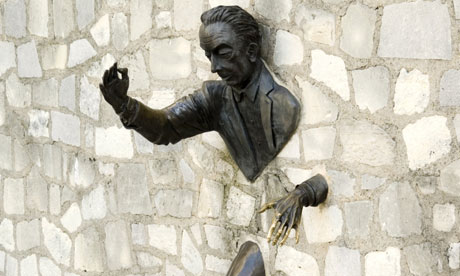It was about halfway through the first, and title story of this collection, at the moment when the mild-mannered clerk, Dutilleul, pushed to the limits of endurance by his boss, sticks his head through the wall and announces that he – the boss – is "a ruffian, a boor, and a scoundrel", that I first thought to myself: "Marcel Aymé, where have you been all my life?" (The head-through-the-wall business is not a matter of violence: Dutilleul can actually walk through walls, which also means, following the logic through, that he can make his head appear "mounted on the wall like a hunting trophy".
I had vaguely heard of Aymé; almost certainly walked through the Place named after him between Montmartre cemetery and Sacré Coeur; or passed, blindly, the sculpture of Aymé himself, caught halfway through the act of passing through a wall. This "vaguely hearing of someone" will not do, and the next time I am in Paris, I am going to find the sculpture and pay homage before it. For I have fallen utterly, completely and eternally in love with this writer. And, as with all true love, I am neither ashamed nor afraid to declare it to the world.
You will find, perhaps, that there is something vaguely familiar about these stories, or some of them: a dreamlike quality, somewhere between Kafka and Will Self's early stories, of a fantastic premise taken to logical conclusion, but with a kind of gentle firmness, as well as great humour. In "The Sabine Women" (a very good way of translating the original title, "Les Sabines", as you will discover), a young woman has the gift of ubiquity, meaning she can duplicate herself as many times as she wishes; falling in love at will and whim, she finds herself so bored by one new husband, a pastor with "the cold, scoured look of someone determined to despise what they don't understand", that she drowns herself in a Scottish lake while going for a walk with him. This is played as comedy, and it works.
A writer suffering under the wartime rationing of life – unproductive types such as he are allowed only 15 days of life per month – blandly reports that Céline has grumbled that "it was another Jewish plot, but I'm sure that his bad mood was leading him astray on that particular point." Then there is a tax collector, whose duty to serve himself with a warning that his taxes are overdue, combined with the elopement of his wife, leads him down a hall of mirrors whose precise nature it would be unfair to disclose here. I'll just say that it leads to a conclusion whose audacity left me with the kind of goofy, admiring smile of someone who has seen an unbelievable magic trick pulled off perfectly.
Stories which use elements of the fantastic can often do so only by treating the people in them as characterless automata; but Aymé cares about the people he creates. They are real, and so are their hopes and fears and cares. (Come to think of it, his closest corollary could be the Gogol of "The Nose".) Not all his stories have some kind of surreal gag as their motor: they can be as poignant and touching as anything written by the greatest masters (at least two of them had me almost in tears at the end). If you think you prefer novels to short stories, think again, because these have depth beyond their length and punch well above their weight. Many were written in occupied France and conjure, obliquely, with the absurd horrors of wartime.
And yet, dealing as they so often do with impossible but common desires, they are timeless. This is helped by a translation which, while retaining the Gallic flavour, reads as though the stories were composed in English, it is so smooth and graceful. I would almost promise I will personally come round and refund your money if you aren't delighted by them. I probably won't, so don't hold me to it, but this is the kind of thing that these stories make this smitten reviewer feel like saying.










